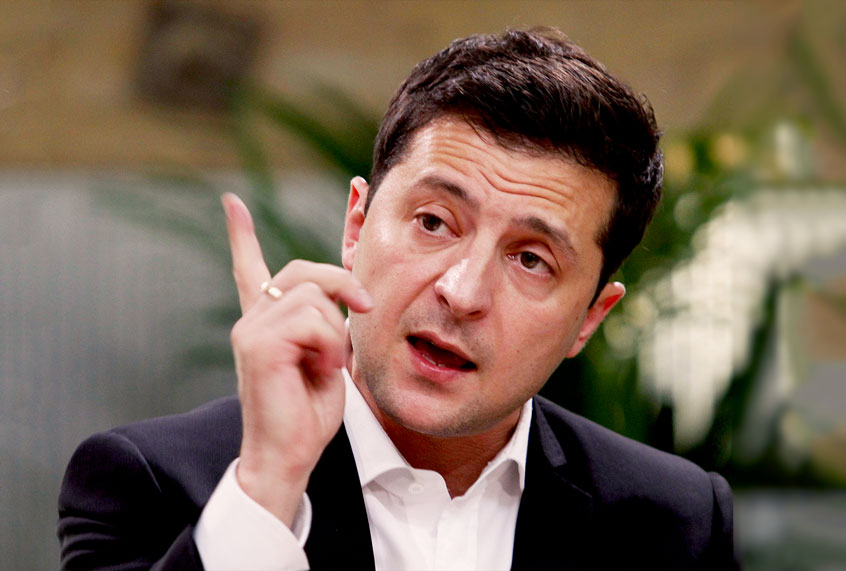Ukrainian President Volodymyr Zelenskyy on Friday warned that the world should prepare for Russia to use nuclear weapons as part of its ongoing assault.
When asked if he is worried that Russian President Vladimir Putin might use a so-called tactical nuclear weapon on Ukraine, Zelenskyy told CNN‘s Jake Tapper: “Not only me—I think all of the world, all the countries, have to be worried because… it can be not real information, but it can be truth.”
The Kremlin could use nuclear or chemical weapons, argued Zelenskyy, because it doesn’t value the lives of would-be victims. “We should… not be afraid but be ready,” the besieged president said in English from his office in Kyiv. “But that is not a question for Ukraine, not only for Ukraine but for all the world, I think.”
Zelenskyy’s comments came one day after CIA Director Bill Burns said that U.S. officials are closely monitoring the possibility of a cornered Putin launching nuclear weapons.
“Given the potential desperation of President Putin and the Russian leadership, given the setbacks that they’ve faced so far militarily, none of us can take lightly the threat posed by a potential resort to tactical nuclear weapons or low-yield nuclear weapons,” Burns said in a public address at Georgia Tech, though he emphasized that the U.S. has not yet seen evidence of Moscow preparing to take such a step.
Zelenskyy’s Friday message stands in sharp contrast to remarks he made in early March when he called Putin’s threat to use nuclear force in response to Western military intervention a “bluff.” At the time, Putin had recently put Russia’s nuclear forces on “special alert” after Zelenskyy asked the North Atlantic Treaty Organization (NATO) to impose a no-fly zone over Ukraine—an escalatory move that peace advocates have vehemently rejected.
Meanwhile, Finnish Minister of European Affairs Tytti Tuppurainen told Sky News on Friday that Finland, which shares an 810-mile border with Russia, is “highly likely” to join NATO, though “a decision has not yet been made.”
Finnish Prime Minister Sanna Marin and Swedish Prime Minister Magdalena Andersson participated in a joint press conference in Stockholm on Wednesday, during which Marin said that Finland will make a formal decision on NATO membership “within weeks.” Sweden, which has not fought in a war for more than 200 years, is also reviewing its security arrangements in the wake of Russia’s invasion of Ukraine.
Moscow responded by threatening to deploy nuclear weapons to the Baltic region if Sweden and Finland join the U.S.-led military alliance.
Dmitry Medvedev, deputy chairman of Russia’s Security Council and close ally of Putin, said Thursday that “there can be no more talk of any nuclear-free status for the Baltic—the balance must be restored.”
“Until today, Russia has not taken such measures and was not going to,” said Medvedev, who served as the country’s president from 2008 to 2012 and its prime minister from 2012 to 2020.
Medvedev added that Russia’s land borders “will have to be strengthened,” and he vowed to “seriously strengthen the grouping of ground forces and air defense [and] deploy significant naval forces in the Gulf of Finland.”
In response, Lithuanian Defense Minister Arvydas Anušauskas pointed out that Moscow already has nuclear weapons in the Baltic region. Russia has been storing missiles in its Kaliningrad enclave—located on the Baltic Sea between NATO members Lithuania and Poland and just over 300 miles from Berlin—since before Putin launched his war on February 24, the minister told the Baltic News Service.
“The current Russian threats look quite strange when we know that, even without the present security situation, they keep the weapon 100 km from Lithuania’s border,” said Anušauskas. “Nuclear weapons have always been kept in Kaliningrad. The international community, the countries in the region, are perfectly aware of this. They use it as a threat.”
Lithuanian Prime Minister Ingrida Šimonytė added that Russian threats of nuclear escalation are “nothing new.”
According to Sky News, polls in Sweden and Finland have shown significant public support for joining NATO.
However, Agnes Hellström, president of the Swedish Peace and Arbitration Society, told Democracy Now! on Thursday that “the recent debate in Sweden has been very narrow and pro-NATO.”
“The polls… still don’t show support from a majority of the people of Sweden,” said Hellström. “So, I think that it has been growing, the support, but at the same time, it’s been the only option presented to us by the media, more or less.”
She continued:
I think, in Sweden, as in many countries right now, it’s been a big amount of fear after the invasion of Ukraine. And therefore, it’s like the easiest—it’s the easiest solution to join a military alliance that would protect you in case of war. But at the same time, war is always devastating, so we have to do everything we can to prevent war, the war spreading or just war starting in other parts of our surroundings. So, I think it’s a reflex that you choose that because it’s the easiest way. But at the same time, we have to use this really wide pallet of choices right now or to solutions to try to get a ceasefire and try to deescalate this conflict. And that’s why I think this analysis that Sweden is going to make, it has to take a lot of time. It’s been being discussed for years in Sweden. And it’s been a majority of the parties of the government—the parliament have been opposed to NATO membership—well, until recently.
Hellström stressed that peace activists “don’t think it would make us safer or the world more secure. It would make us part of a nuclear doctrine, and our possibility to be a voice for democracy, prevention, and disarmament would decrease.”

